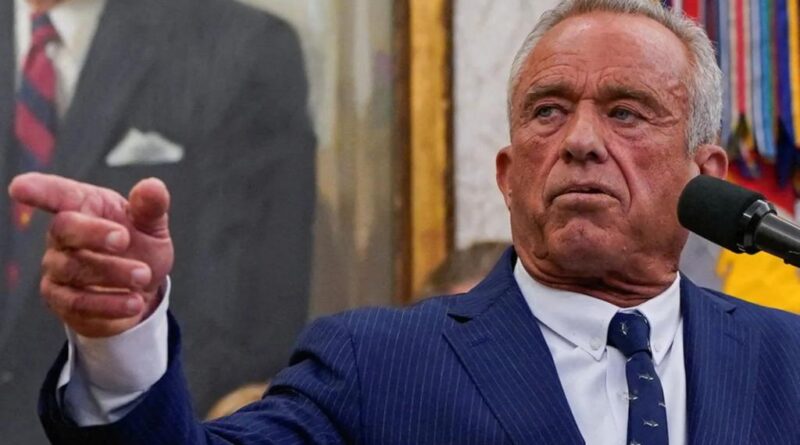RFK Jr. Continues to Promote His Discredited Claims About Autism

Robert F. Kennedy Jr. has propagated numerous troubling theories throughout his life, but his alarmist stance on autism and vaccines stands out as particularly egregious.
It is not just that the new Health and Human Services secretary has led thousands of Americans to believe that they bear some responsibility for their children’s autism— a notion he has infamously compared to a “holocaust.”
This rhetoric poses a significant risk, potentially endangering thousands of children for no scientifically sound reason.
Kennedy asserts that there has been a dramatic rise in autism diagnoses over the past four decades.
During his Senate confirmation hearings, he claimed, “Autism rates have gone from 1 in 10,000 [in 1980] to 1 in 34 today.”
Kennedy reiterated this figure during his swearing-in ceremony, adding, “Who can believe that? There’s something wrong. There’s something wrong, and I think it’s something that can be found out.”
President Trump echoed this statistic on Truth Social and in his executive order establishing the Make America Healthy Again Commission.
The origin of the 1-in-10,000 figure remains unclear.
As early as 1966, when autism was defined primarily by social isolation and withdrawn behavior, researchers estimated that about 1 in 2,500 children were autistic.
Perhaps Kennedy will next refer back to 1943, the year autism was first recognized as a distinct condition, at which point only 1 in 100 million Americans were diagnosed.
The notion that anyone had a reliable grasp on the number of autistic children in prior decades, much less applied consistent criteria, is absurd.
Autism was not even classified separately from schizophrenia in the Diagnostic and Statistical Manual of Mental Disorders until 1980, coinciding with the rise he claims began.
Prior to 1991, the federal government treated children with autism as part of other “intellectual disabilities.” In 1994, the definition of autism expanded to include Asperger syndrome and children on the milder end of the spectrum.
Researchers began systematically tracking autism only in 2000. The American Academy of Pediatrics did not recommend routine autism screenings for all children until 2006, and even then compliance was inconsistent.
Current diagnostic guidelines were not established until 2013. Furthermore, autism lacks a definitive diagnostic test, such as a blood test, resulting in significant discrepancies in prevalence across states, influenced by varying levels of awareness and testing.
For instance, states like Rhode Island and Maryland show higher autism rates compared to Louisiana and Texas.
During a hearing, when Sen. Bill Cassidy, a physician, urged the HHS nominee to “unequivocally reassure mothers” that vaccines do not cause autism, RFK failed to do so.
“If the data is there, I will absolutely do that,” Kennedy replied. “Not only will I do that, but I will also apologize for any statements that misled people otherwise.”
However, he is unlikely to follow through, as substantial data already exists which he continues to disregard, perpetuating debunked claims and inducing fear.
Let’s briefly set aside the fact that studies indicate autism likely originates in the womb, long before any vaccines are administered to children.
Kennedy gained notoriety in the anti-vaccine movement by asserting in Rolling Stone and other outlets that there was a correlation between thimerosal, a vaccine preservative, and the “epidemic of childhood neurological disorders.”
He claimed that the government colluded with Big Pharma to conceal the risks associated with thimerosal.
However, there has never been any credible evidence supporting this assertion, and eventually, the publications retracted Kennedy’s articles.
Indeed, RFK has consistently ignored numerous CDC studies showing no link between thimerosal and autism.
In 2004, Danish researchers analyzed every child vaccinated in their country from 1971 to 2000 and concluded that there “was no trend toward an increase in the incidence of autism during the period when thimerosal was in use.”
Once thimerosal was removed from most vaccines due to these unfounded fears, Kennedy shifted his focus to unsubstantiated fears regarding unknown factors in MMR vaccines causing a spike in autism.
At least 27 significant studies have found no connection between MMR vaccines and autism.
How many studies will it take to elicit an apology from Kennedy? Will it be 28? Or 128?
Moreover, a 2013 CDC study found no link between the number of vaccine antibodies and the risk of being diagnosed with autism.
In 2015, JAMA published the largest randomized, double-blind, placebo-controlled clinical trial on vaccines ever conducted, which analyzed health records for over 95,000 children and found no increased risk of autism associated with the MMR vaccine.
While it is beneficial to “question science,” serious individuals engage in this practice every day.
However, if you spend your life disregarding the overwhelming scientific evidence, you’re not critically questioning science; you’re simply spreading misinformation. And in this case, it’s dangerously so.
David Harsanyi is a senior writer at the Washington Examiner. Twitter @davidharsanyi



